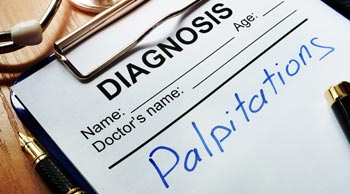What are Palpitations and Other Arrhythmias
 Arrhythmias are a disturbed rhythm of your heartbeat. Some are not a cause for concern, while others are more serious. Untreated arrhythmias can sometimes be life threatening. Your heart has four chambers – two upper chambers (atria) and two lower chambers (ventricles). The atria contract and push blood into the ventricles. The ventricles contract, pumping blood to your lungs and to the rest of your body. Heartbeats are controlled by electrical signals created by your heart’s natural pacemaker, the sinus node, located in the right atrium. The ventricles receive these signals via the atrioventricular node (the gatekeeper between the upper and lower chambers). This is a normal heart rhythm or sinus rhythm.
Arrhythmias are a disturbed rhythm of your heartbeat. Some are not a cause for concern, while others are more serious. Untreated arrhythmias can sometimes be life threatening. Your heart has four chambers – two upper chambers (atria) and two lower chambers (ventricles). The atria contract and push blood into the ventricles. The ventricles contract, pumping blood to your lungs and to the rest of your body. Heartbeats are controlled by electrical signals created by your heart’s natural pacemaker, the sinus node, located in the right atrium. The ventricles receive these signals via the atrioventricular node (the gatekeeper between the upper and lower chambers). This is a normal heart rhythm or sinus rhythm.
Palpitations are a sensation of your heart beating. They may feel like your heart is racing, thumping, or skipping beats. They are usually associated with an abnormal heart rhythm (arrhythmia) and almost everyone has experienced them at some point in their life.
There are two main types of arrhythmia: tachycardia and bradycardia.
Tachycardia is when your heart beats too fast, generally more than 100 beats per minute. It can be a result of physical activity, but it can also be a sign of a medical issue.
Supraventricular tachycardia is a problem in the top chambers or atria of the heart and is not usually life threatening. Common types of supraventricular tachycardia are atrial flutter and atrial fibrillation.
Ventricular tachycardia is when the bottom chambers of your heart (ventricles) beat too fast and is very dangerous. Ventricular tachycardia can lead to ventricular fibrillation, a life-threatening condition where the electrical signal that triggers your heartbeat behaves erratically. It must be corrected immediately, or it can cause low blood pressure, loss of consciousness, or death.
Bradycardia is when your heart beats too slowly, generally less than 60 beats per minute. It becomes serious when your heart beats so slowly that it can’t pump enough blood to meet your body’s needs. Bradycardia can be associated with being physically fit or it can be caused by physical disorders like sick sinus syndrome and heart block. Sick sinus syndrome is when the sinus node in your heart malfunctions, telling your heart to beat slowly. It can be caused by aging or by coronary heart disease. Heart block is when there is a delay in the electrical signal from your atria to the ventricles. It often results from damage, caused by coronary heart disease and aging.
Occasional palpitations during periods of emotional or physical stress are normal.
Symptoms
The symptoms of more serious arrhythmias include:
- Persistent palpitations that feel like pounding, galloping or fluttering
- Chest pain
- Dizziness or fainting
- Sweating
- Shortness of breath
- Light-headedness
- Fullness in the throat or neck
Possible Causes
Palpitations may be caused by:
- Physical activity
- Emotional stress
- Ceasing medications
- Caffeine
- Nicotine
- Illicit substances
Certain medications can cause arrhythmias such as:
- Appetite suppressants
- Beta blockers
- Caffeine, including pre-workout supplements, energy drinks
- Cocaine
- Amphetamines
- Nicotine in cigarettes
- Alcohol
- Some asthma medications
- Thyroid medications
Arrhythmia can be a symptom of more serious underlying disorders, including:
- Cardiovascular disease (including a history of previous heart attacks)
- Heart valve or heart muscle abnormalities
- Congenital heart disease
- Overactive thyroid gland
- Problems with the electrical circuitry of the heart, such as blocked signals or signals taking an abnormal path through the heart
- Significant electrolyte abnormalities
- Irritable heart cells sending extra electrical signals
Your doctor can perform several tests to determine if you have an irregular heart rhythm such as an electrocardiogram (ECG), electrophysiology studies (EPS), or chest x-ray.
Treatment
Treatment for an arrhythmia depends on its cause and how much it’s affecting your health and lifestyle. Not all arrhythmias are dangerous or life threatening. Sometimes, the heart is healthy, but its regular rhythm is interrupted by emotional stress or physical activity.
Treatment for arrhythmia may include:
- Medication
- A pacemaker
- An implantable cardiac defibrillator
- Defibrillation
- Electrical cardioversion
- Catheter ablation
- Surgery
- Lifestyle changes